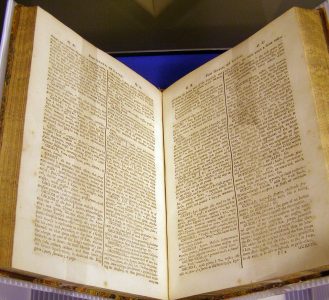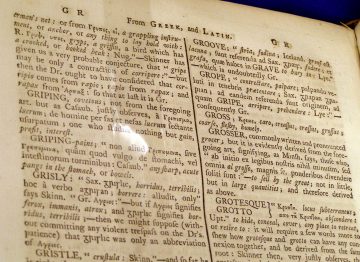With the holidays just around the corner, I know you are all worried about making time (in between shopping, baking, wrapping, packing, cleaning, etc.) to visit The Road to the OED exhibition at Rare Books and Special Collections before it closes on December 24. Well, worry no longer! The exhibition has been extended until the end of January, so we look forward to seeing you all in the New Year!
In this week’s student dictionary report from the course English 320: History of the English Language, we learn about etymologist George Lemon and his study of the roots of the English language.
Lemon, George William. English Etymology; or, A Derivative Dictionary of the English Language. London: Printed for G. Robinson, 1783. PE25 .R62 V. 215
Born in Middlesex in 1726, George William Lemon led a life of various interests; he graduated from Queen’s College Cambridge with a BA, became an ordained priest in East Walton, and was high master at Norwich grammar school, until he resigned after controversy over his management of the school. His scholarly publications included a new Greek grammar to be put into use at the Norwich school, as well as a history of the War of the Roses. English Etymology; or a Derivative Dictionary of the English Language: in Two Alphabets was Lemon’s main lexicographical work, a 12,000 entry-long endeavour to chronicle the etymological roots of words in the English language, printed in 1783.
Whereas most modern dictionaries include a succinct account of each entry’s etymological background, Lemon’s etymological dictionary is formatted with a wider organizational scheme in mind. His dictionary is in two major parts, the first and larger section an alphabetized dictionary of words he determines as having Greek or Latin roots. The second, much smaller section, is a list of those words he considers as having been derived from Saxon and other “Northern dialects”. This division by etymological background functions to demonstrate what Lemon thought was “the whole force and power of the English language [to] know how much the greater part of it has been constructed on the Southern than on the Northern tongues”; that is, his belief that the English language’s apparent familial connections to the languages of antiquity, especially Classical Greek and Latin, was an expression of the language’s refinement and status as an internationally superior language.
As a dictionary whose focus is mainly on the etymological aspects of words, English Etymology does not include several of the features of modern monolingual dictionaries now considered standard; none of his entries include pronunciation or other basic information like part of speech, and most entries also do not provide a definition of the word beyond what can be understood from the forms he cites as etymological evidence. Also notable is his dependence on other etymologists, whose work Lemon compiled, edited, and disputed within many of the entries in his dictionary. “Who shall be able to account for the origin of language; or who shall say which was the original of all? Such an attempt would be a task too difficult for mortal man to accomplish”, says Lemon in his preface. His etymological dictionary, however, does attempt to draw connections between English and the languages of antiquity as it endeavours to support the English language as one worthy of extensive study and appreciation. As such, it certainly works within a tradition of lexicographical curiosity that continues to characterize the writing of dictionaries today.
— Kai Ying Chieh (English 320: History of the English Language, 2012-2013)


Respected sir
Is their any chance to download this books sir .?
Our copy of English Etymology; or, A Derivative Dictionary of the English Language has not been digitized, so it is not available for download, but it looks like you can find an online copy via the Internet Archive. Good luck!